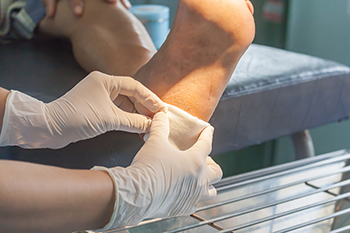
Non-diabetic foot ulcers, though less common than those stemming from diabetes, can be equally troublesome if left untreated. These ulcers are often related to poor circulation, nerve damage, or trauma. Risk factors include peripheral artery disease, neuropathy, infections, and pressure injuries. Symptoms include persistent pain, redness, and swelling from open wounds that do not heal. Treatment generally involves wound care, infection management, and addressing underlying causes, such as improving blood flow or adjusting footwear. Advanced therapies may also be used. Prognosis varies depending on the ulcer's severity and the patient's overall health, but prompt intervention significantly improves outcomes. If you have a foot wound that is not healing, it is strongly suggested that you schedule an appointment with a podiatrist for a proper diagnosis and treatment.
Wound care is an important part in dealing with diabetes. If you have diabetes and a foot wound or would like more information about wound care for diabetics, consult with one of our podiatrists from Fusion Foot and Ankle. Our doctors will assess your condition and provide you with quality foot and ankle treatment.
What Is Wound Care?
Wound care is the practice of taking proper care of a wound. This can range from the smallest to the largest of wounds. While everyone can benefit from proper wound care, it is much more important for diabetics. Diabetics often suffer from poor blood circulation which causes wounds to heal much slower than they would in a non-diabetic.
What Is the Importance of Wound Care?
While it may not seem apparent with small ulcers on the foot, for diabetics, any size ulcer can become infected. Diabetics often also suffer from neuropathy, or nerve loss. This means they might not even feel when they have an ulcer on their foot. If the wound becomes severely infected, amputation may be necessary. Therefore, it is of the upmost importance to properly care for any and all foot wounds.
How to Care for Wounds
The best way to care for foot wounds is to prevent them. For diabetics, this means daily inspections of the feet for any signs of abnormalities or ulcers. It is also recommended to see a podiatrist several times a year for a foot inspection. If you do have an ulcer, run the wound under water to clear dirt from the wound; then apply antibiotic ointment to the wound and cover with a bandage. Bandages should be changed daily and keeping pressure off the wound is smart. It is advised to see a podiatrist, who can keep an eye on it.
If you have any questions, please feel free to contact our offices located in Fort Worth and Arlington, TX . We offer the newest diagnostic and treatment technologies for all your foot care needs.


